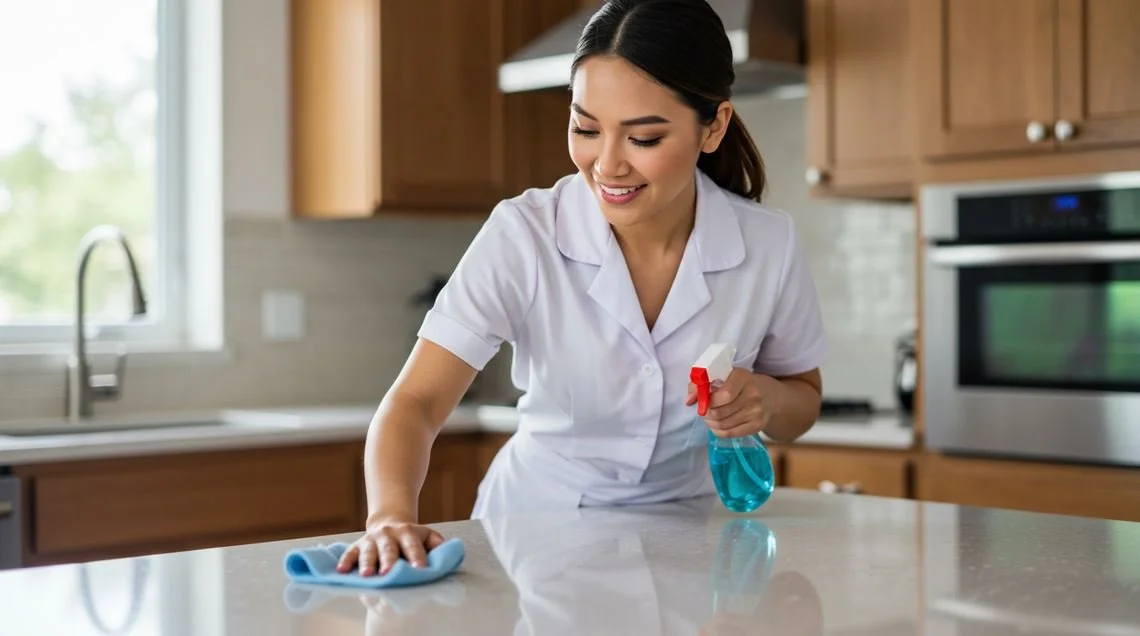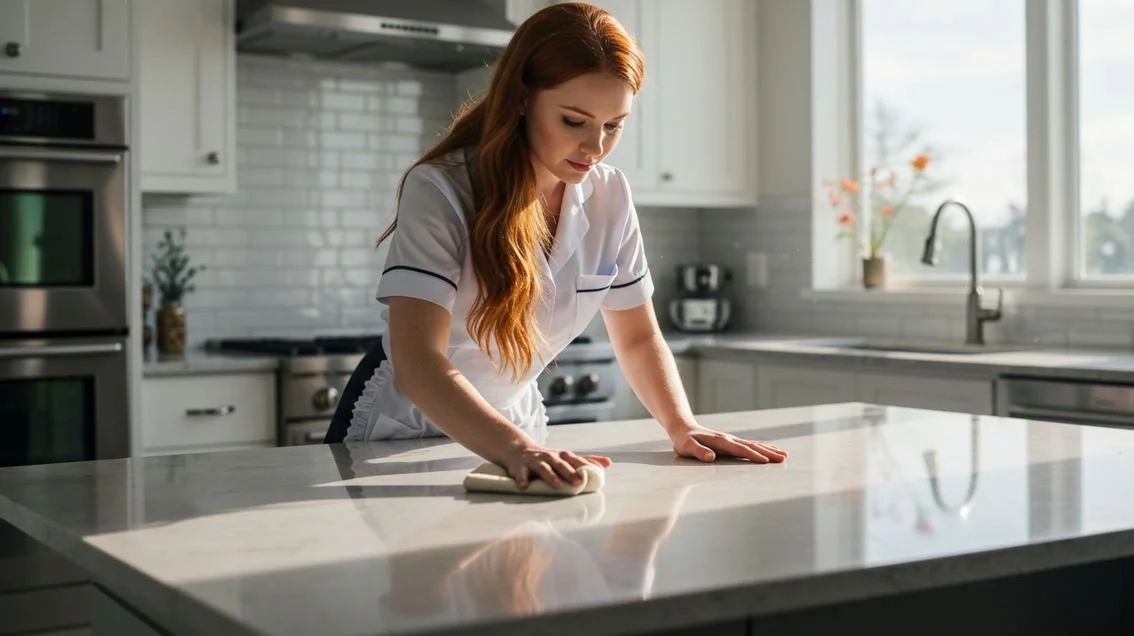What NOT To Use On Quartz Countertops? (7 Things)
So, you've got quartz countertops. Nice choice! They're gorgeous, durable, and low-maintenance - which is exactly what most of us want in a kitchen or bathroom.
But even though quartz is tough, it's not invincible. You still need to treat it right if you want it looking brand new for years to come. There are a few things that can really mess with your quartz surfaces.
In this post, we’ll go over seven things you should not use on quartz countertops.
#1 Harsh Chemicals
Okay, this is a big one. Harsh chemicals are a no go for quartz.
That means bleach, ammonia, oven cleaners, and those heavy-duty degreasers you’d use on a grill or garage floor.
Quartz might look like stone, but it’s actually engineered. It’s made from crushed stone, resin, and pigments. The resin is what gives it that smooth, glossy finish. But that same resin can break down or discolor when it comes in contact with harsh stuff.
So if you're cleaning up a mess, stick to something simple like warm water, a bit of dish soap, and a soft cloth. That’s usually all you need.
Also Read: Can You Mix Pine-Sol And Vinegar?
Pro tip: If you accidentally spill something strong (like nail polish remover or drain cleaner), wipe it up immediately and rinse the area. Don't let it sit.
#2 Abrasive Cleaners And Tools
Scrub brushes, steel wool, and gritty powders should not be used on quartz countertops either.
Quartz is scratch-resistant, but it’s not scratch-proof. Using anything abrasive can dull the surface or leave behind little scratches you’ll only notice when the light hits just right and then you’ll always notice them.
Some common culprits include:
Scouring pads
Cleaning powders (like Comet or Bar Keepers Friend)
Magic Erasers (they’re great, but they can be surprisingly rough)
Instead, go for soft things like microfiber cloths or non-scratch sponges. And if you’ve got a dried-on mess, try soaking it with a damp cloth for a few minutes before gently wiping it away.
Be gentle and avoid rubbing it with sandpaper.
#3 Excessive Heat
Quartz can handle heat, but only to a point.
Unlike granite, which is all-natural stone, quartz is bound together with resins. And those resins? They’re not fans of high temperatures.
Setting a hot pan, skillet, or baking sheet directly on the counter might not leave a mark right away. But over time, you could end up with discoloration, burn marks, or even little cracks in the surface.
So don’t risk it. Always use a trivet or hot pad. They take two seconds to grab, and they can save you from a permanent reminder of that time you made lasagna.
Also Read: Can You Use Lysol Wipes On Quartz?
And it’s not just pots and pans. Crockpots, instant pots, and even hair styling tools (if you’ve got quartz in your bathroom) can cause heat damage if left sitting for too long.
#4 Sharp Objects
We’ve all been there - you’re chopping something quickly and don’t feel like grabbing a cutting board. But if you’re tempted to slice veggies or cut up pizza directly on your quartz surface, don’t.
Quartz is hard, yes. But those sharp knife blades can still scratch the surface.
Plus, you’ll probably dull your knives faster, too. It’s a lose-lose.
And it’s not just knives. Be cautious with other sharp or heavy tools like screwdrivers or even some kitchen gadgets. Dropping a heavy object or dragging something with sharp edges across your counter could leave a nasty mark.
Moral of the story: keep the cutting on the board, not the countertop.
#5 Strong Solvents
Paint removers, nail polish remover (especially if it has acetone), turpentine, and other heavy-duty solvents can be super damaging to quartz.
These products break down the resin, and once that happens, there’s really no going back.
So don’t use any strong solvents on quartz.
You might not use this stuff every day, but if you’re doing some DIY projects, painting your nails, or cleaning out drawers and cabinets nearby, just be careful.
If something spills, clean it up fast. And maybe throw down a towel or protective surface while you’re working just to be safe.
Also Read: Bar Keepers Friend On Quartz
#6 Standing Water And Moisture
Quartz is non-porous. That means it won’t absorb water like marble or granite, which is awesome.
But it still doesn’t like sitting in puddles of moisture for long periods.
Excessive water, especially around sinks or in bathrooms, can break down the caulking or adhesive holding your countertops in place. Over time, this can lead to lifting, warping, or even mold issues.
So after you wipe something down or do the dishes, do a quick pass with a dry towel to remove any leftover water. It's just a good habit to get into.
Also, don’t leave wet sponges or cloths sitting directly on the surface for hours. They might trap moisture underneath and eventually cause discoloration. Just wring them out and set them somewhere else.
#7 Stain-Prone Substances
Quartz is resistant to staining but it's not 100% immune. There are a few things that, if left sitting long enough, can leave a mark or discolor the surface.
Watch out for stuff like:
Red wine
Coffee and tea
Tomato sauce
Curry
Oils and grease
If you spill any of these, try to wipe them up quickly.
Especially avoid things like turmeric or beet juice. They’re beautiful in food but kind of a nightmare on countertops.
And again, no need for panic if you spill something. Just don’t let it sit overnight while you binge Netflix. Clean it up, give it a quick rinse, and you’re golden.
Bottom Line
Quartz is amazing, no doubt. It’s one of the most low-maintenance countertop materials out there. But like anything else, it needs a little TLC to stay looking its best.
Avoid harsh chemicals, abrasive scrubbers, and extreme heat. Don’t chop directly on the surface or let water sit for too long. And be mindful of staining ingredients.
That’s pretty much it.
The good news? You don’t need a science lab full of fancy products or a long list of rules. Just treat it with care and a little common sense, and your quartz counters will keep sparkling for years.
Plus, it gives you an excuse to use all those cute trivets, coasters, and cutting boards you’ve got stashed away. Win-win.
So next time you’re in the kitchen or bathroom, just keep this list in the back of your mind.

